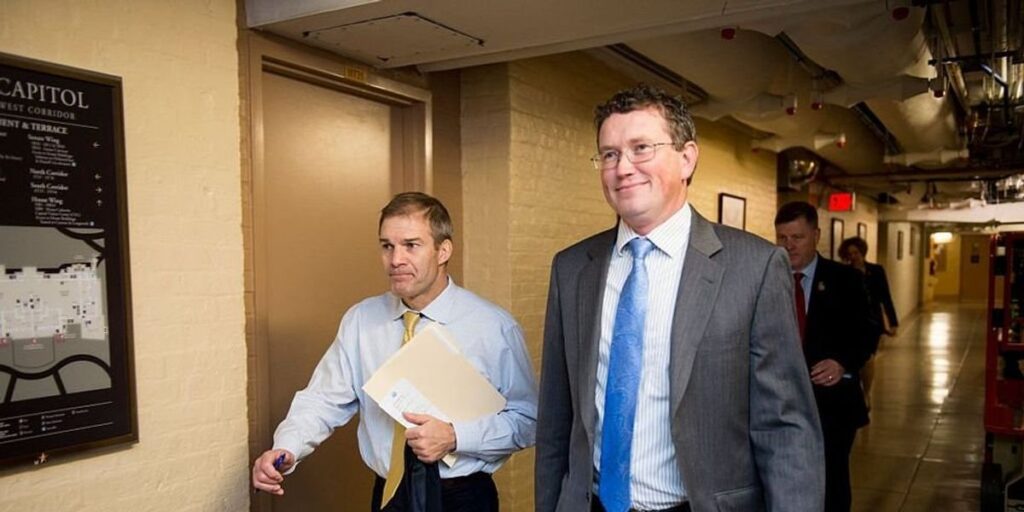Republican lawmakers are expanding an investigation into banks allegedly voluntarily sharing customers’ private financial data with the FBI around the time of the Jan. 6 riot at the Capitol, the GOP’s House Judiciary Committee announced Monday.
“The banks should not be conducting a dragnet for the FBI where every customer is a suspect, and if they are, we need to do something about it because it’s an end-run around the Constitution,” Rep. Thomas Massie (R-Ky.) told TheBlaze in an interview Monday afternoon.
“Did the FBI wink and nod at the banks and say, ‘Well, we can’t ask you to give this to us, but if you voluntarily gave it to us, we can receive it?'” Massie said, adding that if such an action had in fact occurred, he would consider it to be “just more evidence of malfeasance at the FBI.”
Rep. Massie and Rep. Jim Jordan (R-Ohio) fired off letters Monday to the CEOs of six of the country’s largest financial institutions: JP Morgan Chase & Company, Citigroup, Truist Financial Corporation, Wells Fargo, U.S. Bancorp, and PNC Financial Services.
“Just like with the Twitter censorship, if you have one company in a field doing it, probably the rest of them are as well,” Massie said. Massie emphasized that the letters were not based on a mere “hunch.” To the contrary, they were based on testimony from career FBI officials about Bank of America sharing customers’ financial information.
“[The FBI whistleblowers] have no reason to make this up. And so I think there is some there-there. We need to find out what that is.”
The letters summarize the testimony of two FBI whistleblowers. Those whistleblowers told the Select Subcommittee on the Weaponization of the Federal Government that the Bank of America voluntarily provided the FBI with a list of individuals who made transactions in the D.C. area in a three-day timeframe around the January 6, 2021, riot at the Capitol.
Bank of America also provided the FBI with transactions at gun shops, Massie told TheBlaze. Crucially, the gun shop purchases were not geofenced to D.C. and were not limited in time.
“I would use cash for purchases that I don’t want the government to know about, because based on information we have from FBI whistleblowers, it seems your financial data is not safe and your privacy is not maintained by the banks with respect to the government.”
“The banks generated the list of suspects for the FBI,” Massie also said.
“If there’s something that the government is precluded from doing by the Constitution, they can’t create a loophole by having private institutions who aren’t bound by the Constitution do it for them and then share it with them.”
The letters, dated June 12, were addressed to JP Morgan Chase & Company CEO Jamie Dimon, Citigroup CEO Jane Fraser, Truist Financial Corporation CEO William H. Rogers Jr., Wells Fargo CEO Charles W. Scharf, U.S. Bancorp CEO Andrew Cecere, and PNC Financial Services CEO William S. Demchak.
The Committee on the Judiciary and the Select Committee on the Weaponization of the Federal Government requested a response by June 26 to produce documents related to communications with federal law enforcement agencies concerning the use of their products, such as debit and credit cards.
If the banks do not comply with the request, Massie said the next step would be a subpoena.
If the banks do comply with the request, depending on what members find, the committee may call in the banks to talk to them. Depending on what the committee finds if and when the banks produce the requested documents, Massie told TheBlaze new legislation preventing it happening again could be on the table.
Like Blaze News? Bypass the censors, sign up for our newsletters, and get stories like this direct to your inbox. Sign up here!


